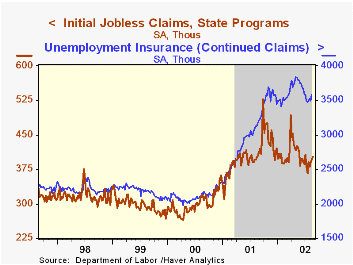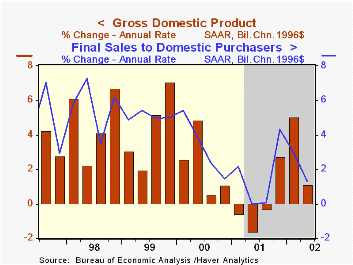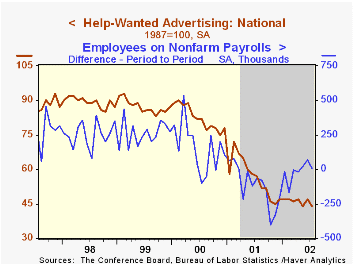 Global| Aug 29 2002
Global| Aug 29 2002Initial Claims for Jobless Insurance Rose Again
by:Tom Moeller
|in:Economy in Brief
Summary
Initial claims for unemployment insurance were higher than expected in the latest week, rising above 400,000 for only the second week since May. Claims rose 8,000 (2.0%) versus the prior week which was revised up. The Consensus [...]

Initial claims for unemployment insurance were higher than expected in the latest week, rising above 400,000 for only the second week since May. Claims rose 8,000 (2.0%) versus the prior week which was revised up.
The Consensus forecast was for a rise in claims to 385,000. It was the third consecutive rise in weekly claims.
The four-week moving average rose for the third consecutive week to 392,750.
Continuing claims for unemployment insurance jumped 2.6% from the prior week's level which was revised down.
The weekly insured rate of unemployment rose slightly to 2.8% but the prior week's level was revised down.
| Unemployment Insurance (000s) | 8/24/02 | 8/17/02 | Y/Y | 2001 | 2000 | 1999 |
|---|---|---|---|---|---|---|
| Initial Claims | 403.0 | 395.0 | -0.2% | 405.8 | 299.8 | 297.7 |
| Continuing Claims | -- | 3,588 | 14.5% | 3,021 | 2,114 | 2,186 |
by Tom Moeller August 29, 2002

GDP growth last quarter was left unrevised, as expected. A slight upward revision to inventories offset a downward revision to domestic demand.
Domestic final demand growth of 1.3% was the weakest since two quarters during the middle of last year when demand was virtually unchanged. Higher consumer spending (1.9%, AR) and business spending on equipment (3.1%) offset a sharp decline in business spending on structures (-17.8%) which fell hard for the third consecutive quarter.
Trade sector deterioration was little revised and lowered GDP growth by 1.7 percentage points. Exports grew 12.3% (AR) and imports surged 22.8%. Both figures were little changed.
Production increases to slow the rate of inventory decumulation added slightly more to GDP growth than was initially estimated.
Corporate profits with IVA and CCA adjustments fell 6.6% (AR). It was the second consecutive quarterly decline at that rate.
Estimated inflation was little changed at roughly half last year's pace.
| Chained '96 $, % AR | 2Q'02 (Prelim.) | 2Q'02 (Advance) | 1Q'02 | Y/Y | 2001 | 2000 | 1999 |
|---|---|---|---|---|---|---|---|
| GDP | 1.1% | 1.1% | 5.0% | 2.1% | 0.3% | 3.8% | 4.1% |
| Inventory Effect | 1.4% | 1.2% | 2.6% | 0.6% | -1.2% | 0.1% | -0.2% |
| Final Sales | -0.3% | -0.1% | 2.4% | 1.5% | 1.5% | 3.7% | 4.3% |
| Trade Effect | -1.7% | -1.8% | -0.8% | -0.7% | -0.1% | -0.6% | -0.9% |
| Domestic Final Demand | 1.3% | 1.6% | 3.0% | 2.2% | 1.6% | 4.3% | 5.2% |
| Chained GDP Price Deflator | 1.1% | 1.2% | 1.3% | 1.0% | 2.4% | 2.1% | 1.4% |
by Tom Moeller August 29, 2002

The Conference Board's National Index of Help-Wanted Advertising in July reversed all of the prior month's rebound.
The proportion of labor markets with rising want-ad volume fell to the lowest level (22%) since October.
During the last five years there has been a 78% correlation between the level of help-wanted advertising and the monthly change in nonfarm payrolls.
Job opportunities deteriorated broadly across regions of the country.
The figures are seasonally adjusted.
| Conference Board | July | June | July '01 |
|---|---|---|---|
| National Help Wanted Index | 44 | 47 | 57 |
Tom Moeller
AuthorMore in Author Profile »Prior to joining Haver Analytics in 2000, Mr. Moeller worked as the Economist at Chancellor Capital Management from 1985 to 1999. There, he developed comprehensive economic forecasts and interpreted economic data for equity and fixed income portfolio managers. Also at Chancellor, Mr. Moeller worked as an equity analyst and was responsible for researching and rating companies in the economically sensitive automobile and housing industries for investment in Chancellor’s equity portfolio. Prior to joining Chancellor, Mr. Moeller was an Economist at Citibank from 1979 to 1984. He also analyzed pricing behavior in the metals industry for the Council on Wage and Price Stability in Washington, D.C. In 1999, Mr. Moeller received the award for most accurate forecast from the Forecasters' Club of New York. From 1990 to 1992 he was President of the New York Association for Business Economists. Mr. Moeller earned an M.B.A. in Finance from Fordham University, where he graduated in 1987. He holds a Bachelor of Arts in Economics from George Washington University.
More Economy in Brief
 Global| Feb 05 2026
Global| Feb 05 2026Charts of the Week: Balanced Policy, Resilient Data and AI Narratives
by:Andrew Cates






